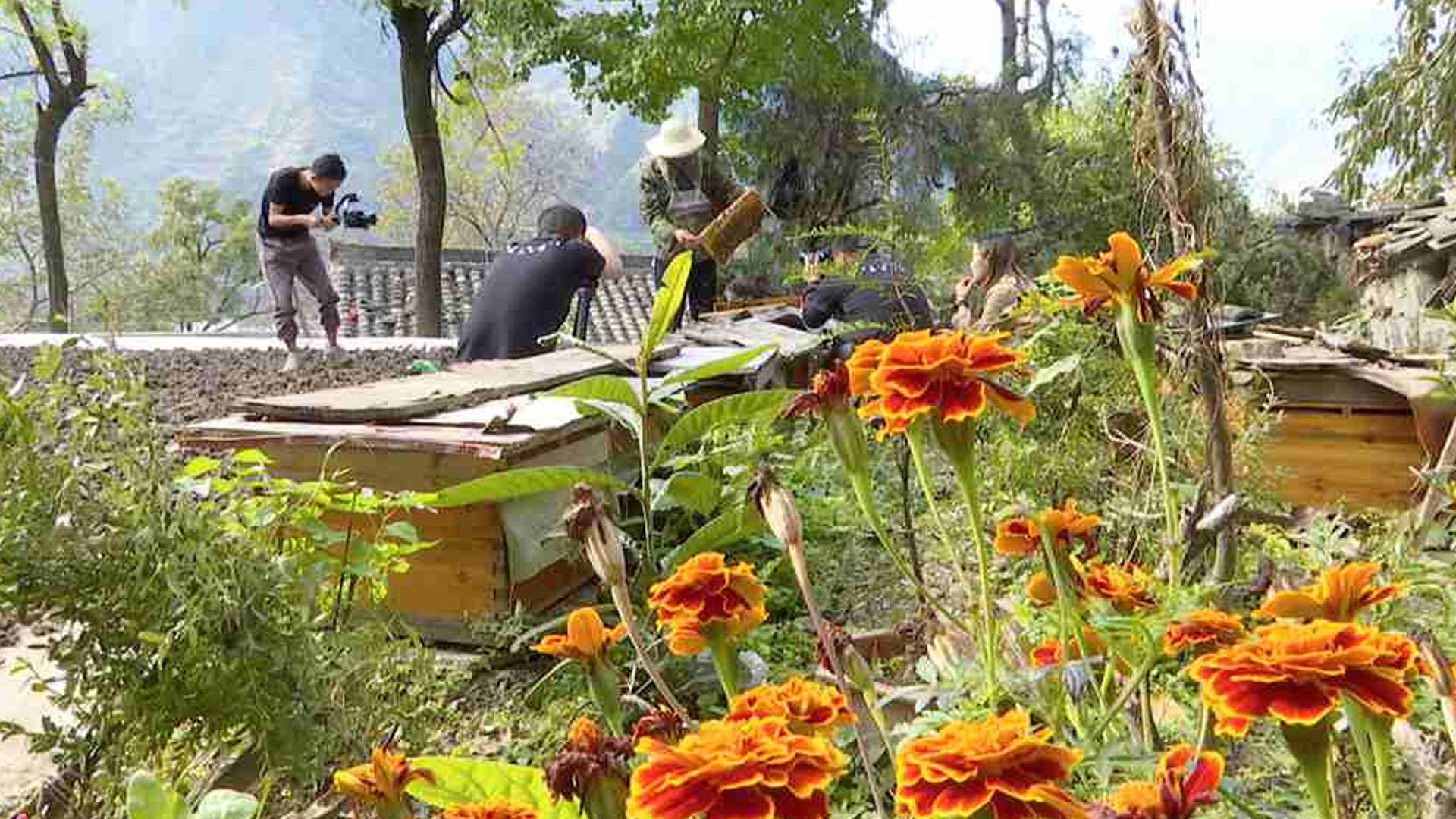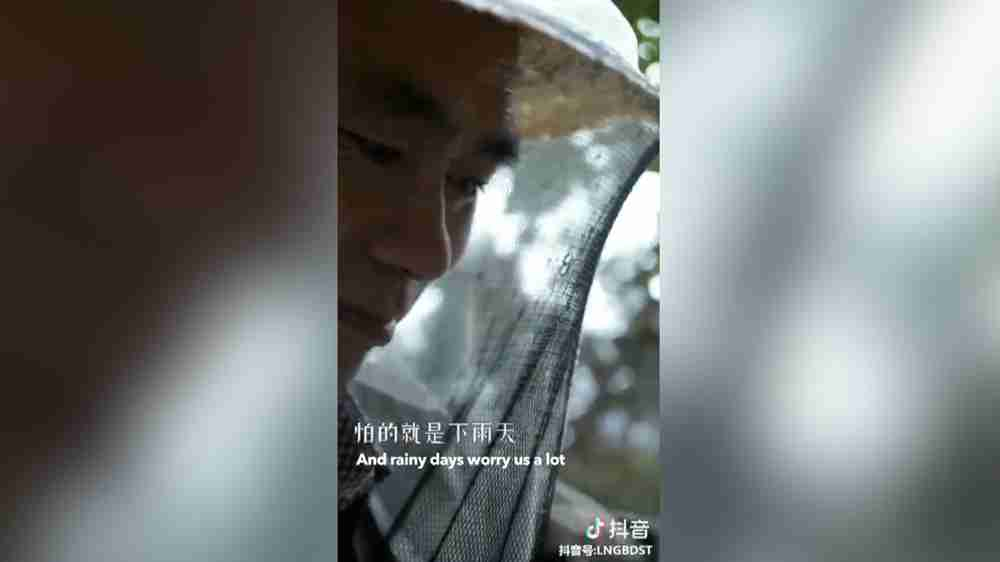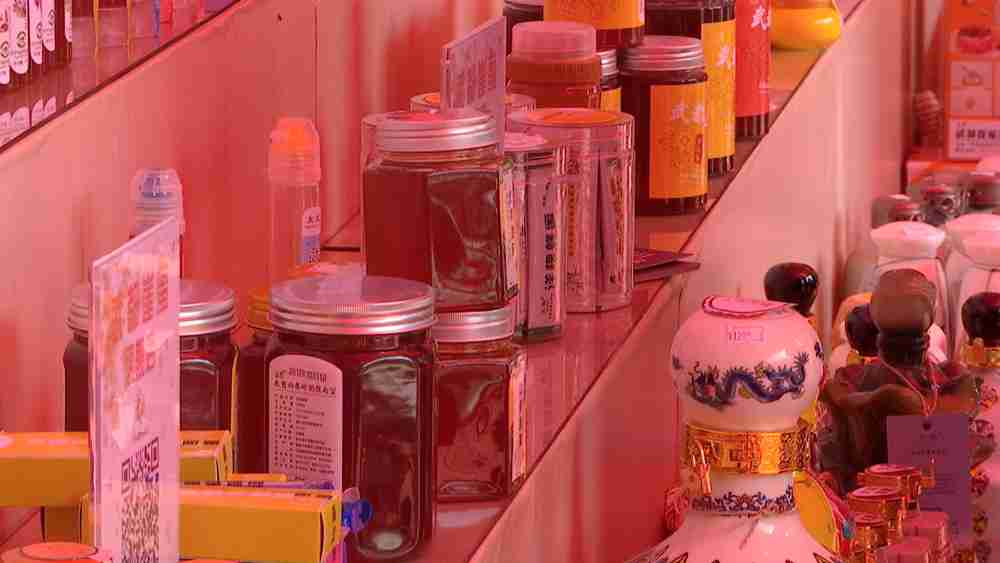03:27

"I have been raising bees for 26 years. I started bee keeping before I could do much else. As bee keepers, we love bees dearly. And rainy days worry us so much. Two years ago, under the auspices of a beekeeping cooperative, we started selling honey online and stopped worrying about distribution. No matter how hard it is, we now have hope of living above poverty."
This is the monologue in a short video posted on Douyin, a leading Chinese short video and social media mobile app, also known as TikTok.
The title of the minute-long clip in Chinese translates to "A Bee Keeper's Diary from Wudu Cliff".
Shi Pingshe, a beekeeper from Longnan City's Wudu district in northwest China's Gansu Province is the star of the clip.

Shi Pingshe, supervisor of Tianlong Beekeeping Cooperative, shares his life raising bees and producing honey in short videos posted on TikTok. /CGTN Photo
Shi Pingshe, supervisor of Tianlong Beekeeping Cooperative, shares his life raising bees and producing honey in short videos posted on TikTok. /CGTN Photo
Shi is in charge of a local beekeeping cooperative. The cooperative has over 1,000 beehives and each hive can produce up to 30 kilograms of honey.
"I am raising the eastern honey bee – which is only found in China. Their honey has a thicker texture and rich nutritional value," said Shi.
Shi's cooperative supplies the honey to a local seller – Sunriver. Situated around 1,500 meters above sea level, the honey is branded as Wudu Cliff Honey.
E-commerce has been able to ease logistics for Shi and Sunriver to sell their honey to bigger markets, but in order to attract younger shoppers, they started to try something new.

Sunriver is a local honey maker in Gansu's Longnan City with supplies from local beekeepers. The firm helps with packaging and distribution. With an annual production capacity of 1,000 tonnes of honey, the firm is currently running at half of that. /CGTN Photo
Sunriver is a local honey maker in Gansu's Longnan City with supplies from local beekeepers. The firm helps with packaging and distribution. With an annual production capacity of 1,000 tonnes of honey, the firm is currently running at half of that. /CGTN Photo
Sunriver has hired a local production team to produce short clips about local beekeeping with the hope of attracting digital-savvy younger generation.
"The younger generation is drawn to new media channels such as short videos, and new media has a pretty wide coverage. I hope this kind of promotion can boost our reputation," said Chen Xiangfu, general manager of Sunriver.
Sunriver sells about 400 to 500 tonnes of honey a year, and a third of them are now being sold online. The hope is to double their online sales through promoting their product on popular new media platforms like TikTok.
And honey is not the only regional product being promoted to China's growing online population.

Liu Yatong (L), owner of Longnan Lan Yi Culture, sits down with CGTN. With preferential policies in the region, her firm can reimburse their production costs from the district government for helping promoting local agricultural products. /CGTN Photo
Liu Yatong (L), owner of Longnan Lan Yi Culture, sits down with CGTN. With preferential policies in the region, her firm can reimburse their production costs from the district government for helping promoting local agricultural products. /CGTN Photo
Lan Yi Culture is the production company that helped Sunriver and Shi film and produce videos targeting younger buyers. In addition to short videos, Lan Yi also helps clients – local farmers – host online live-streams and organize agro-themed eSports competitions. Some of their projects garner millions of views.
"New ways to promote local agricultural products started popping up in early 2018. Traditionally, agricultural products were marketed towards older consumers and lacked exposure to millennials," said Liu Yatong, owner of Longnan Lan Yi Culture.
But those born in the 1980s and 1990s are now bigger buyers. And they spend a lot of time watching short online videos, live-streaming and playing mobile games, Liu said.
Each short video by Liu's company costs roughly 1,000 yuan (about 150 US dollars) to produce. It's much cheaper than traditional advertising and affordable for most local agriculture producers.
And as farmers become more tech-savvy, many of them have started shooting, producing and posting content themselves, saving money.
Nevertheless, online views, at the moment, can hardly translate to real money, but at least more people are getting to know about them.





